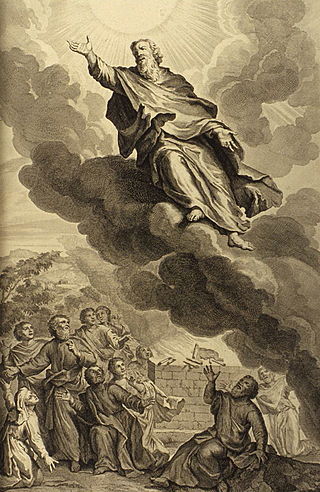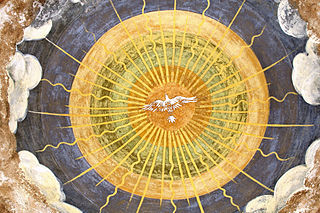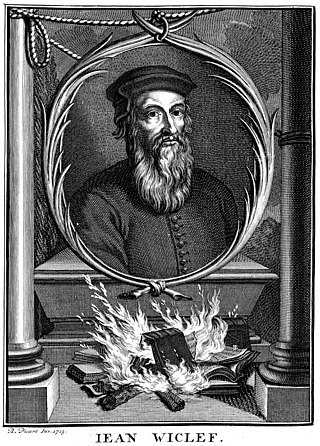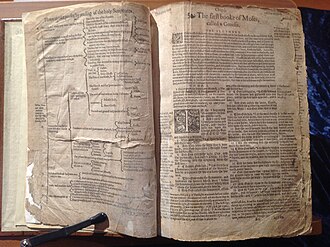
Reformed Christianity, also called Calvinism, is a major branch of Protestantism that began during the sixteenth-century Protestant Reformation, a schism in the Roman Catholic Church. Today, it is largely represented by the Continental Reformed, Presbyterian, Reformed Anglican, Congregationalist, and Reformed Baptist denominational families.

Predestination, in theology, is the doctrine that all events have been willed by God, usually with reference to the eventual fate of the individual soul. Explanations of predestination often seek to address the paradox of free will, whereby God's omniscience seems incompatible with human free will. In this usage, predestination can be regarded as a form of religious determinism; and usually predeterminism, also known as theological determinism.
Sola scriptura is a Christian theological doctrine held by most Protestant Christian denominations, in particular the Lutheran and Reformed traditions, that posits the Bible as the sole infallible source of authority for Christian faith and practice. The Catholic Church considers it heterodox and generally the Orthodox churches consider it to be contrary to the phronema of the Church.

Perseverance of the saints is a Christian teaching that asserts that once a person is truly "born of God" or "regenerated" by the indwelling of the Holy Spirit, they will continue doing good works and believing in God until the end of their life.

Predestination is a doctrine in Calvinism dealing with the question of the control that God exercises over the world. In the words of the Westminster Confession of Faith, God "freely and unchangeably ordained whatsoever comes to pass." The second use of the word "predestination" applies this to salvation, and refers to the belief that God appointed the eternal destiny of some to salvation by grace, while leaving the remainder to receive eternal damnation for all their sins, even their original sin. The former is called "unconditional election", and the latter "reprobation". In Calvinism, some people are predestined and effectually called in due time to faith by God, all others are reprobated.

Enoch is a biblical figure and patriarch prior to Noah's flood, and the son of Jared and father of Methuselah. He was of the Antediluvian period in the Hebrew Bible.

Pneumatology refers to a particular discipline within Christian theology that focuses on the study of the Holy Spirit. The term is derived from the Greek word Pneuma, which designates "breath" or "spirit" and metaphorically describes a non-material being or influence. The English term pneumatology comes from two Greek words: πνεῦμα and λόγος. Pneumatology includes study of the person of the Holy Spirit, and the works of the Holy Spirit. This latter category also includes Christian teachings on new birth, spiritual gifts (charismata), Spirit-baptism, sanctification, the inspiration of prophets, and the indwelling of the Holy Trinity. Different Christian denominations have different theological approaches on various pneumatological questions.

In Christian theology, justification is the event or process by which sinners are made or declared to be righteous in the sight of God.
The Boyle Lectures are named after Robert Boyle, a prominent natural philosopher of the 17th century and son of Richard Boyle, 1st Earl of Cork. Under the terms of his Will, Robert Boyle endowed a series of lectures or sermons which were to consider the relationship between Christianity and the new natural philosophy then emerging in European society. Since 2004, this prestigious Lectures series has been organized, with the assistance of Board of the Boyle Lectures, by the International Society for Science and Religion (ISSR) and has been held at one of its original locations, the Wren church of St Mary-le-Bow on Cheapside in the City of London.
Sanctification literally means "to set apart for special use or purpose", that is, to make holy or sacred. Therefore, sanctification refers to the state or process of being set apart, i.e. "made holy", as a vessel, full of the Holy Spirit of God. The concept of sanctification is widespread among religions, including Judaism and especially Christianity. The term can be used to refer to objects which are set apart for special purposes, but the most common use within Christian theology is in reference to the change brought about by God in a believer, begun at the point of salvation and continuing throughout the life of the believer. Many forms of Christianity believe that this process will only be completed in Heaven, but some believe that complete holiness is possible in this life.
Hyper-Calvinism is a branch of Protestant theology that places strong emphasis on supralapsarianism, or salvation from eternity, where the atonement of Christ was and is difficult for the non-elect to understand, where man has little to do with his salvation, there being nothing man can do to resist being saved, wherein evangelism was given lower emphasis as compared to traditional Calvinism, and where assurance of salvation was felt within a person, identified by introspection.
The infallibility of the Church is the belief that the Holy Spirit preserves the Christian Church from errors that would contradict its essential doctrines. It is related to, but not the same as, indefectibility, that is, "she remains and will remain the Institution of Salvation, founded by Christ, until the end of the world." The doctrine of infallibility is premised on the authority Jesus granted to the apostles to "bind and loose" and in particular the promises to Peter in regard to papal infallibility.
The rule of faith is the name given to the ultimate authority in Christian belief or fundamental hermeneutic (interpretive) standard. It was used by Early Christian writers such as Tertullian. The phrase is sometimes used for early creeds.
Free will in theology is an important part of the debate on free will in general. Religions vary greatly in their response to the standard argument against free will and thus might appeal to any number of responses to the paradox of free will, the claim that omniscience and free will are incompatible.

In Christianity, God is believed to be the eternal, supreme being who created and preserves all things. Most Christians believe in a monotheistic, trinitarian conception of God, which is both transcendent and immanent. Most Christians believe in a singular God that exists in a Trinity, which consists of three persons: God the Father, God the Son, and God the Holy Spirit. Christian teachings on the transcendence, immanence, and involvement of God in the world and his love for humanity exclude the belief that God is of the same substance as the created universe but accept that God the Son assumed hypostatically united human nature, thus becoming man in a unique event known as "the Incarnation".

Cessationism versus continuationism involves a Christian theological dispute as to whether spiritual gifts remain available to the church, or whether their operation ceased with the Apostolic Age of the church. The cessationist doctrine arose in the Reformed theology: initially in response to claims of Roman Catholic miracles. Modern discussions focus more on the use of spiritual gifts in the Pentecostal and Charismatic movements, though this emphasis has been taught in traditions that arose earlier, such as Methodism.
Christian theology is the theology – the systematic study of the divine and religion – of Christianity and Christian belief and practice. It concentrates primarily upon the texts of the Old Testament and of the New Testament, as well as on Christian tradition. Christian theologians use biblical exegesis, rational analysis and argument. Theologians may undertake the study of Christian theology for a variety of reasons, such as in order to:

The theology of John Calvin has been influential in both the development of the system of belief now known as Calvinism and in Protestant thought more generally.
Veli-Matti Kärkkäinen is a Finnish theologian. He is Professor of Systematic Theology at Fuller Theological Seminary. He is an ordained Lutheran minister and an expert on Pentecostal-Charismatic theologies.

Proto-Protestantism, also called pre-Protestantism, refers to individuals and movements that propagated various ideas later associated with Protestantism before 1517, which historians usually regard as the starting year for the Reformation era. The relationship between medieval sects and Protestantism is an issue that has been debated by historians.











